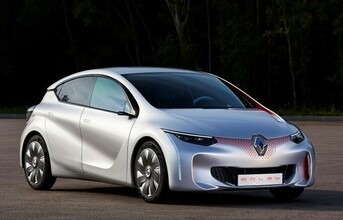
Renault has recently presented EOLAB, a new prototype which explores ways to deliver ultra-low fuel consumption. It boasts NEDC combined cycle consumption* of 1 litre/100km, equivalent to 22g of CO2/km.
To achieve such low figures, the designers focused their efforts on three main areas: minimising weight, refining aerodynamics and using "Z.E. Hybrid" technology for all, a brand new initiative which permits zero emissions* motoring during everyday use.
As an innovative showcase with an environmental core, EOLAB includes a very high number of technological advances that are destined to be carried over gradually to vehicles available in the showroom.
As a consequence, EOLAB underlines the undertaking of Renault - already a pioneer in the field of zero-emission mobility** thanks to its range of electric vehicles - to take even greater steps to produce affordable models that have an increasingly smaller carbon footprint.
Technologies geared to achieving ultra-low fuel consumption for all For Renault, the purpose of EOLAB is to remain true to the company's DNA by ensuring that ultra-low fuel consumption becomes a reality for as many people as possible.
This in turn means making its technologies available at a price that people can afford. EOLAB features materials such as magnesium and aluminium, which are extremely light and also much cheaper than titanium. Meanwhile, the notion of such a car being produced in large numbers within the next 10 years was dialled into the plan from the very start.
100 technological advances for future Renaults
EOLAB is much more than just a styling exercise or a mere shop window. Conceived around a B-segment platform, the prototype incorporates around 100 new, realistic technological developments that are designed to be introduced gradually on upcoming Renault vehicles.
* Fuel consumption, emissions and range data homologated in accordance with appropriate legislation.
** No CO2 or other regulated polluting emissions during road use.
(Continued on next page)



























